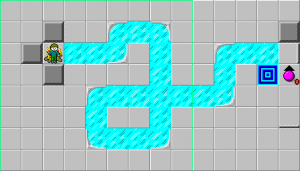Please create an account or Login! Have fun!
Lucky timing: Difference between revisions
Jump to navigation
Jump to search
m (ReedemtheD3ad moved page Lucky Timing to Lucky timing: ) |
mNo edit summary |
||
| Line 1: | Line 1: | ||
[[File:Lucky timing example.png|thumb|300px|alt=lucky timing example|An example level illustrating lucky timing. The green box indicates [[Chip]]'s current field of vision. Note that the [[pink ball]] is not visible to Chip until after he steps on the [[ice]].]] | [[File:Lucky timing example.png|thumb|300px|alt=lucky timing example|An example level illustrating lucky timing. The green box indicates [[Chip]]'s current field of vision. Note that the [[pink ball]] is not visible to Chip until after he steps on the [[ice]].]] | ||
'''Lucky | |||
'''Lucky timing''' refers to a type of guesswork in which the player has to time their interactions with an obstacle (e.g. dodging and getting past a [[monster]], pushing a sliding [[block]], or entering an open [[toggle wall]]) without being able to know or predict the current state of the obstacle. Generally, this involves stepping onto a long [[ice]] slide with the obstacle at the other end. | |||
{{Stub}} | {{Stub}} | ||
[[Category:Terminology]] | [[Category:Terminology]] | ||
Revision as of 23:50, 21 May 2019
Lucky timing refers to a type of guesswork in which the player has to time their interactions with an obstacle (e.g. dodging and getting past a monster, pushing a sliding block, or entering an open toggle wall) without being able to know or predict the current state of the obstacle. Generally, this involves stepping onto a long ice slide with the obstacle at the other end.
